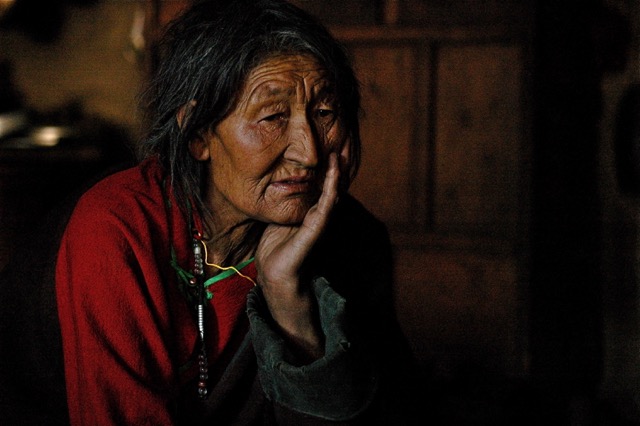Elder Drolma from Dzogong speaks and reminisces about the days of the Tea Horse Road linking her home in eastern Tibet with Lhasa and beyond. In her words “It was a journey that both gave and took life”. Both Drolma and her husband offered up bo jia (butter tea) while speaking about an eternal route of tea, trade, and of relentless movement through the mountains.

These words (like so many from the elders) spoke of something tangible and fierce, but ultimately of a route that bound cultures within the Himalayas’ protective walls to others that they would never meet. The Tea Horse Road was one of the great Himalayan pipelines and providers to peoples whose version of luxury might extend to a single extra brick of tea or a bag of salt.
They spoke of a route of punishing and suffering landscapes that ranks as one of the great adventures. Always though was the reminder that the mountains also protected.
When our team of six moved on from Drolma’s home with full bellies and lumps in the throat, she wished us well on our way to Lhasa and with a small grin (that kept it all very real) reminded that though Lhasa was the holy place, she’d heard that thieves were perhaps more clever there and told us to “Bow on your knees to the great Jokhang Temple while keeping one hand on your knives”.

About JeffFuchs
Bio
Having lived for most of the past decade in Asia, Fuchs’ work has centered on indigenous mountain cultures, oral histories with an obsessive interest in tea. His photos and stories have appeared on three continents in award-winning publications Kyoto Journal, TRVL, and Outpost Magazine, as well as The Spanish Expedition Society, The Earth, Silkroad Foundation, The China Post Newspaper, The Toronto Star, The South China Morning Post and Traveler amongst others. Various pieces of his work are part of private collections in Europe, North America and Asia and he serves as the Asian Editor at Large for Canada’s award-winning Outpost magazine.
Fuchs is the Wild China Explorer of the Year for 2011 for sustainable exploration of the Himalayan Trade Routes. He recently completed a month long expedition a previously undocumented ancient nomadic salt route at 4,000 metres becoming the first westerner to travel the Tsa’lam ‘salt road’ through Qinghai.
Fuchs has written on indigenous perspectives for UNESCO, and has having consulted for National Geographic. Fuchs is a member of the fabled Explorers Club, which supports sustainable exploration and research.
Jeff has worked with schools and universities, giving talks on both the importance of oral traditions, tea and mountain cultures. He has spoken to the prestigious Spanish Geographic Society in Madrid on culture and trade through the Himalayas and his sold out talk at the Museum of Nature in Canada focused on the enduring importance of oral narratives and the Himalayan trade routes.
His recently released book ‘The Ancient Tea Horse Road’ (Penguin-Viking Publishers) details his 8-month groundbreaking journey traveling and chronicling one of the world’s great trade routes, The Tea Horse Road. Fuchs is the first westerner to have completed the entire route stretching almost six thousand kilometers through the Himalayas a dozen cultures.
He makes his home in ‘Shangrila’, northwestern Yunnan upon the eastern extension of the Himalayan range where tea and mountains abound; and where he leads expeditions the award winning ‘Tea Horse Road Journey’ with Wild China along portions of the Ancient Tea Horse Road.
To keep fueled up for life Fuchs co-founded JalamTeas which keeps him deep in the green while high in the hills.

